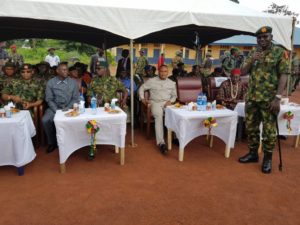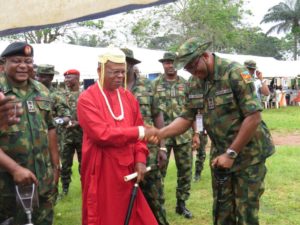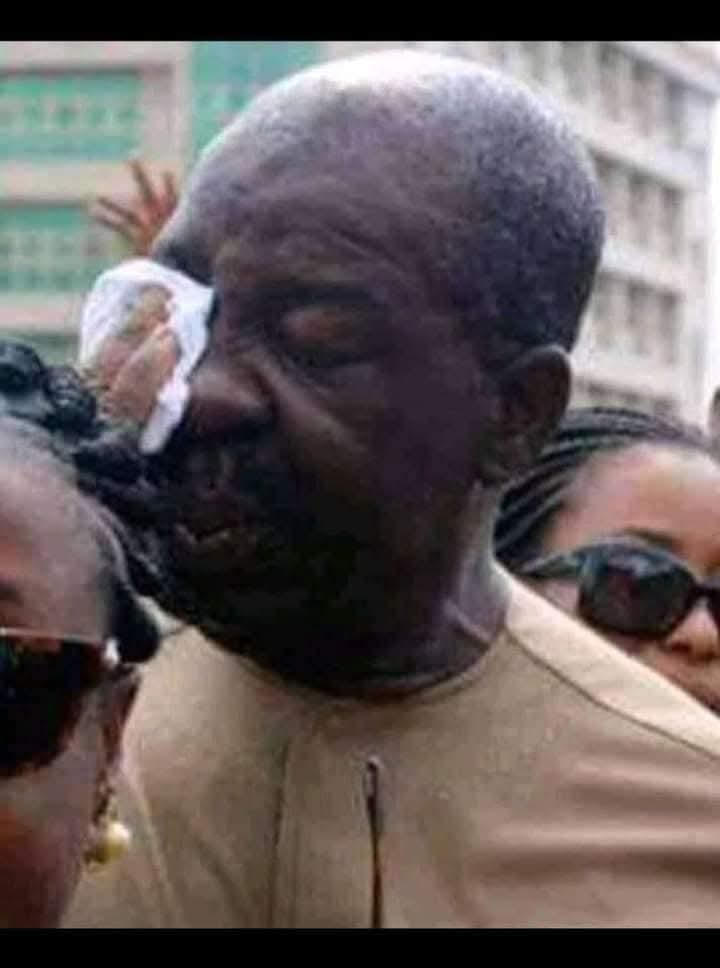Before now, screaming the word soldiers anywhere in Nigeria would attract instant public panic and hysteria. Nigerian military and especially soldiers had a disgusting public aura. They had an unenviable tag as unfriendly professionals, brutes, barbaric and torturers of civilians.
It was bloody for a “bloody civilian” to inspire military instincts in a soldier, anytime, anywhere. Any civilian victim of a soldier’s intemperate anger was sure of his path to his instant extinction by the demons of hell on earth, before advancing the gates of hellfire.
But such dispositions and beastliness in soldiers have ebbed out surprisingly under the administration of President Muhammadu Buhari. The appointment of the Chief of Army Staff (COAS), Lt. Gen. Tukur Yusufu Buratai was informed by several reasons, which also included the inclination of the Presidency to reform, reposition and re-professionalize the Nigerian Army.
Undeniably, Gen. Buratai has handled this assignment expertly. These days, the portrait of an average Nigerian soldier anywhere oozes with discipline, professionalism, friendliness and uniquely sociable .
Nigerians can concede defiantly that in the last two years, Nigerian soldiers have been engaged in numerous special assignments in almost every part of the country. Soldiers have repressed the tempo of militancy in the Niger Delta and determinedly at the verge of the final lethal blow to Boko Haram terrorism in Nigeria’s Northeast.
Neither the armed bandits and cattle rustlers in the Northwest have had the grace to overwhelm civil security and civilians anymore nor their marauding armed comrades terrorizing Nigerians in the Middle Belt, as evidenced in the herders/farmers clashes.
Insurrectional groups, which have assumed the character of terrorists have kept grumbling and groaning. Soldiers are reinventing their absurd radicalism and repugnant fanatical ideologies to make them better human beings to co-inhabit with other Nigerians peacefully. They preach repentance or resort to combat where necessary for public interest. What is more fascinating is the friendly mien, the civic decorum and the infinite zeal of soldiers on special assignments to passionately protect the human rights of Nigerians.

The ongoing Operation Python Dance II in Southeast Nigeria, translated into the Igbo vernacular as “Egwu Eke II” is one such rewarding operations to fortify internal security undertaken by the Nigerian Army. In 2016, the clarion call on soldiers necessitated the launch of Operation Python Dance I to cleanse the region of armed criminals who had unrestrictedly seized the peace and security of the Southeast.
The success of the operation resounded in more ways than imagined, just like what the Army replicated elsewhere in Nigeria. Nigerians now perceive soldiers more as friends and protectors, than trumpeters of war or tormentors of the civilian population. No intention to malign, but today’s Nigerian soldiers are more friendly than the Police.
Operation Egwu Eke II has definitely attracted some few negative remarks. It is not unexpected, as only a narrow-minded person would think of absolute acceptance of actions of government. In fact, divergent views enliven and strengthen democratic engagement.
But what cannot be divorced from the “pythonic dance” anchored by the Nigerian Army, in compliance with a Presidential directive is its desirability and timeliness in salvaging a region which had almost given up hope on a peaceful and secured environment. The name of the operation itself is expressive of the denotations.
In Igbo land, the python snake has a likeable myth to Igbo people. Erudite scholar and literary giant, Professor Chinua Achebe explained the value of the python snake to the Igbo in the novel, “Things Fall Apart, ” as a reptile perceived as an ancestral guardian of the people, to the extent no Igbo native dares to kill a python snake in his compound. And if such act is committed in inadvertently, he performs some appeasement rituals and accords the python burial rites similar to a human being.
So, the Army’s choice of the operation as “Python Dance” itself embodies and explicitly explains the protective mission of soldiers in the Southeast region. It is monotonous to reiterate again that the Southeast has been plunged in weird and violent crimes.
The Southeast like any other region in Nigeria is not immune or insulated from violent crimes. But with the ascendency of Nnamdi Kanu’s Indigenous People of Biafra (IPOB), violent crimes engulfed the Southeast and reached a crescendo that submerged the strongest pillars of civil security.
Before the intervention of Operation Python Dance II, an outsider who visits the Southeast and observes the trend could easily run a hasty conclusion that the undignified life of crime delights and pacifies Nigerians. The falsity of the conclusion is measured by the screams and the near perennial psychological trauma victims of violent crimes precipitated by IPOB keep recounting. It is an indication of strong repulsion to what Kanu and his gangs in IPOB had imposed on the people through crude force.
No responsible and responsive leadership abuses the sacred provision of the Constitution which confers on any leader the onerous responsibility of protecting lives and property of the citizenry. President Muhammadu Buhari (PMB) could afford to dilly-dally on some national issues; but dusts off his comic content when threats to public peace, law and order are involved.
The spate of terrorism and other violent acts which besieged Nigeria, when PMB assumed office in 2015 were not only fantastically awful , but potently choked and suffocated Nigeria. It was dragging the nation into the regrettable path of total ruination, had it been allowed to persist. But he acted swiftly, deploying civil security and burdening soldiers where necessary to secure Nigerians. Operation Python Dance II stems from this mindset and the lamentations of weary citizens over torture by super armed gangs, kidnappers/abductors, assassins and , armed robbers with undisguised affinity with IPOB.
The one -month span of the Operation Python Dance II is slightly two weeks old, but respite has returned to a once troubled Southeast region. The initial suspicions and cynicisms, which wrongly ascribed the status of brutes to Nigerian soldiers have eclipsed into eulogies of soldiers as peace descends on the Southeast.
The notion that soldiers were deployed to crush the Igbo nation into submission to federal forces has vanished into the pleasurable savouring of the peace and serene environment violently deprived them by armed gangs. Disciplined and professional soldiers are diligently prosecuting this assignment flawlessly.

It explains why Nigerians are not stampeded with tales of torture, killings and inhuman treatment of the civilian population even when excited criminals overstretch their bond of radicalism and hostility by unjustifiably attacking soldiers in the line of duty. In extreme situations, soldiers arrest and treat them like fellow compatriots, by serving them food and refreshments.
The ordinary Southeasterner, much like the elite, with huge investments in the region, which were intermittently threatened by looting by IPOB’s armed criminal gangs, are collectively singing a new song of liberation. Soldiers have mingled and blended with the civil populace, who are determined now, more than ever, to assist them with privileged information to fish out hardened criminals from the hideouts.
And to checkmate any dereliction of duty, the COAS constantly excuses himself from the theatre of war in Maiduguri to supervise the operations of Operation Python Dance II to ensure strict adherence to the best rules of engagement and the religious observance of the human rights of members of host communities. This cordial interface has railroaded into free medical services to host communities as these soldiers are famed in the North or South.
Just recently, Gen. Buratai personally supervised the free medical services, conducted by troops of Operation Python Dance II. It is their distinctive courtship of host communities anywhere they are deployed on special assignments’. The patriotism of soldiers drafted for the operation is legendary, as reflected in the physical and psychological content and fitness, excited by prompt payment of salaries and legitimate allowances.
An African adage says, after darkness, comes sunshine. Operation Python Dance II has berthed in the Southeast and it is performing a marvelous job to the admiration of law abiding and peace-loving Nigerians in the region. Those scary or gripped by phobia are the armed criminals, who make mince meal of the police but dread soldiers. They are the elements on the run, as the previously obliterated commercial and night life in the region are nicely reviving.
Those pained by the presence of soldiers and instigating a barrage of campaigns against them are the same criminals who have not been allowed to dupe, loot , assassinate and violently rob the people in preparation for yuletide that are loudly complaining about militarization or arguing for withdrawal of troops.
The new feeling of security traversing the Southeast is best surmised by the Abia state Deputy Governor, Chief Ude Oko Chukwu who has not only poured unreserved appreciation to the Nigeria Army “for this wonderful exercise, ” but pontificated that “Abia is better for it security wise”. It’s the new status of the Southeast engineered by soldiers.
It is the guilty who dreads every shadow; much as it is only doubtful and criminal minds that read from different interpretations and perceptions about the presence of soldiers anywhere. But every peaceful and responsible Nigerian echoes loudly today that “soldier Na your friend!”
Odoma wrote this piece from Asokoro, Abuja.





